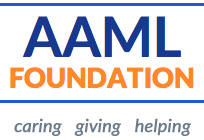Planned Giving
The AAML Foundation Planned Giving program allows donors to make large gifts through methods, either immediate or deferred, that will secure the long-term success of the Foundation’s charitable mission. Planned gifts allow donors to leave a legacy beyond their lifetime that supports AAML Foundation grants to charitable programs aiding children and families struggling through separation, divorce and custody disputes. In addition to the immense gratification of helping children and families in crisis, certain planned giving methods can provide donors with tax benefits.[1]
Planned gifts can be made through a living donation or through a gift upon death. Most methods of planned gifts are simple and uncomplicated. Planned giving can be accomplished through several methods, including the following options:
Living Planned Gift Strategies
- Cash donations, in full or by pledged installments
- Gifts of appreciated securities
- IRA qualified charitable distribution
- Gifts from Donor Advised Funds
Deferred Planned Giving Methods
- Bequests from a will or trust
- Beneficiary designation on life insurance, IRA, 401k or other account
- Charitable lead trust
- Charitable remainder trust
With a living or deferred planned gift of $10,000 or more, you can establish your personal legacy by becoming a member of the Planned Giving Benefactors Society. Planned giving donors, whether by living or deferred gift, will be gratefully acknowledged and listed in the Legacy Donors Directory, will be recognized at Foundation events and published to AAML Fellows in the Newsletter, in the Foundation Annual Report and elsewhere.
The first step is to make a pledge to the Foundation of your gift by completing the Planned Giving Pledge Card. For additional information on making a planned gift, please read Suzanne Harris’ article, “Stand Up For The Foundation”. If you have any other questions about planned giving, please contact Meighan Harmon or Anita Rodarte , Co-chairs of the Planned Giving Committee.
What a better way to help protect children and families for years to come than make a gift with lasting benefits!
[1] The AAML Foundation does not provide tax advice. Donors are urged to consult your tax advisor, financial advisor, or estate planning attorney concerning the tax benefits of different gift methods in your situation.
